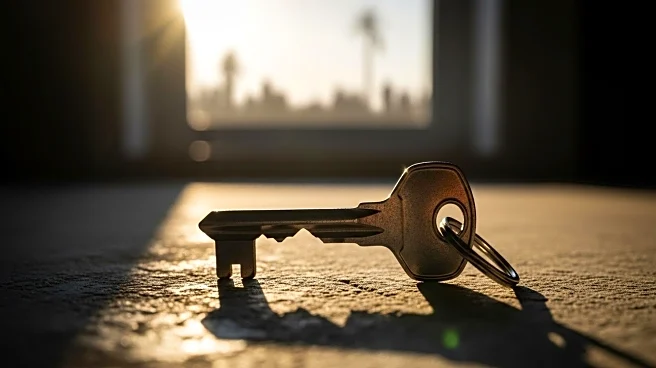What's Happening?
Two years after the October 7, 2023, attack by Hamas militants, many Israelis from communities near the Gaza border remain displaced. The attack, which resulted in the deaths of approximately 1,200 Israelis and the abduction of 251 hostages, left five agricultural communities, or kibbutzim, severely damaged. Reconstruction efforts are ongoing, but progress is slow, with some areas expected to be rebuilt only by next summer. Residents like Noa, a high school teacher from Kfar Aza, are hesitant to return due to safety concerns and the trauma of the attack. The Israeli government has allocated nearly $6 billion for rehabilitation, but delays in budget approval have hindered progress. Some residents feel abandoned by the government, as they await answers on when they can safely return.
Why It's Important?
The prolonged displacement of these communities highlights the ongoing security challenges and the psychological impact of the conflict on Israeli citizens. The situation underscores the complexities of rebuilding in conflict zones and the need for effective government intervention. The delay in reconstruction and the uncertainty faced by residents could lead to long-term demographic and economic shifts in the region. The government's handling of the situation may also influence public perception and trust in its ability to protect and support its citizens. The broader geopolitical implications include the potential for renewed tensions and the impact on Israeli-Palestinian relations.
What's Next?
Reconstruction efforts are expected to continue, with the government under pressure to expedite the process. The return of displaced residents will depend on the completion of rebuilding projects and assurances of safety. The Israeli government may face increased scrutiny and calls for accountability from affected communities and the public. The ongoing conflict and security situation in the region will likely influence the pace and success of rehabilitation efforts. Additionally, the return of hostages and the resolution of outstanding security concerns will be critical in determining the future stability of these communities.
Beyond the Headlines
The situation raises ethical questions about the responsibilities of governments to protect and support their citizens in conflict zones. The psychological trauma experienced by residents, particularly children, may have long-term effects on mental health and community cohesion. The displacement and reconstruction efforts also highlight the resilience of affected communities and their determination to rebuild their lives despite significant challenges. The broader cultural and social implications include the potential for shifts in community dynamics and the preservation of cultural heritage in the face of adversity.








